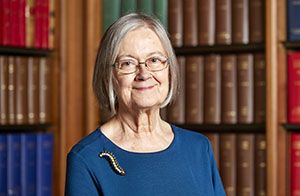The Supreme Court has gained its first female head with Lady Hale today (21 July) confirmed as its new president alongside three new appointments to the UK’s top court.
The appointment, replacing the outgoing Lord Neuberger, will be welcomed by diversity campaigners and the profession’s liberal wing with the outspoken Hale often regarded as the court’s most progressive judge.
The 72-year old Brenda Hale – styled as Baroness Hale of Richmond – initially forged her legal career as an academic at Manchester University, while also practising at the Bar. The Yorkshire-bred product of a state grammar school achieved a string of legal firsts through her career, including becoming the first women appointed to the Law Commission in 1984 and in 2004 becoming the first woman at the UK’s top court when she joined the old House of Lords, five years before its rebirth as the Supreme Court. She previously spent a decade at the High Court and Court of Appeal.
The family and social welfare specialist has handled many of the Supreme Court’s most contentious and high-profile cases and soon became the darling of liberal lawyers, even as her robust style grated among judicial conservatives. Her defining cases included in 2009 R v The Governing Body of JFS, which turned on recognition of faith and admittance to a faith school, and Radmacher v Granatino in 2010, the landmark ruling that recognised the enforceability of prenuptial agreements for the first time in the UK. Hale, who famously appeared in a 2011 BBC documentary on the court, will be expected to continue the drive to position the UK’s top court as more accessible and transparent.
She replaces another popular progressive in Neuberger, who is to conclude his term in September. Hale will reach her mandatory retirement age in 2020 (more recent judicial appointments have controversially been lowered to a 70-year retirement limit).
In a statement, Hale said: ‘I look forward to building upon [Neuberger’s] pioneering achievements, including developing closer links with each part of the United Kingdom, for example by sitting outside London, and improving the ways in which we communicate our work to the public. Recent high-profile cases mean that more people than ever before have heard of the Supreme Court, and we hope that this will help to create a broader understanding of how the judiciary serves society.’
The move comes as three other appointments were made to the court – Lady Justice Black, Lord Justice Lloyd Jones and Lord Justice Briggs – with Black’s appointment giving the 12-strong court its second female jurist.
Of the trio, Briggs brings in the most commercial experience having previously been in charge of the Chancery Modernisation Review in 2013, and leading the Civil Courts Structure Review in 2015 to 2016. He also presided over the mammoth Lehman Brothers insolvency litigation from 2009 to 2013.
Neuberger’s departure comes alongside that of Lord Clarke, who will stand down in September. Lord Toulson retired from the court in September 2016, though the decision was taken to group the new appointments together, delaying his replacement. Toulson died in June 2017 while in hospital for heart surgery.
Bar Council chair Andrew Langdon QC said: ‘It is well known that Baroness Hale is a most distinguished jurist and has long been at the forefront in the task of arguing for a properly diverse judiciary. Her appointment will serve as an encouragement to all in showing how important this is.’
Neuberger added: ‘I have had the pleasure of working closely with Lady Hale over the last five years, and have seen at first hand the intellect and humanity with which she approaches the appeals which come before her, as well as her commitment to the rule of law, legal education and building public understanding of the work of the courts.’
For an in-depth interview with Lord Neuberger click here (£)










